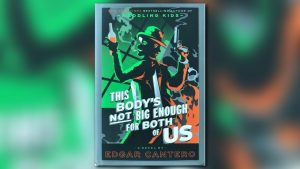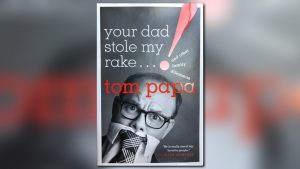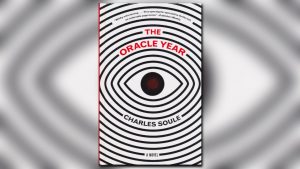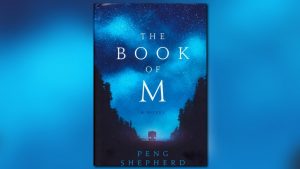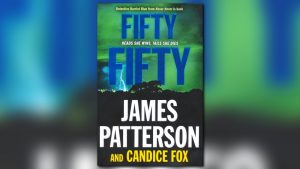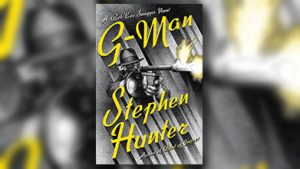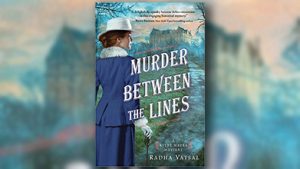Zero is a nickname that the main character, Amanda Welsh, half-heartedly embraces.
Welsh, a discouraged artist whose life seems to be resulting in failure on every front finds support from the most unlikely sources.
After having a falling out with her best friend, realizing she has no money to pay for college and listening to her parents constantly bicker, she finds love with an indie-punk musician.
“Party” is actually a combination of short stories that Leveen was working on all at the same time.
He was developing each character and each story, but he wasn’t quite sure where to take them all.
While on his honeymoon in California, Leveen got the idea for the character “Beckett.” He had his wife scribble down a brief description of her while they were driving through Santa Barbara.
It eventually occurred to him that he should combine all the short stories into one novel.
“Party” contains eleven characters, one for each chapter; each tells his or her story.
The characters intersect in ways neither the characters or reader sees coming.
“Party” dives into the issues of racism, sex, friendship, dating, loss and parents.
Leveen says on his website that it is a great book for anyone to read, especially if they have ever felt betrayed by a friend or been treated unfairly.
Books & Co. 1604
Transcript
NARRATOR: "Books & Co." is made possible by the Virginia G. Piper Center for Creative Writing, serving writers and readers in the Phoenix metropolitan area, the state of Arizona and the world.
ALBERTO RIOS: Welcome to "Books & Co." Bienvenidos, todos. I'm Alberto Rios your host and we're joined today by young adult writer, Tom Leveen who will be talking about his two books "Party" and "Zero." Both of them published by Random House. Welcome, Tom. I'm glad to see you here today.
TOM LEVEEN: Thank you, privileged to be here.
ALBERTO RIOS: And these one-word titles, what's with that?
TOM LEVEEN: They used to be placeholders. I'm lazy. As a matter of fact, "Party" had several different titles over the course of editing, revision and I needed a title, I figured marketing people know what the titles are so I called it "Party" and then time went by and it's out on the shelves and it's still called "Party" just like that. So thank you, we'll go with "Party" and it works.
ALBERTO RIOS: Now, you're stuck with the one word sequence.
TOM LEVEEN: I know, that's okay.
ALBERTO RIOS: Well, that book "Party," we'll start with that. You published it a little earlier before "Zero" and it is an interesting structure. Somewhere between a chorus line and Sherwood Anderson's Ohio, that idea of the each character telling a story and we get the story by having to fill it up together ourselves right? How did you come up with that?
TOM LEVEEN: That was also sort of an accident. It was originally sort of a pastiche of several different short stories that I had, they were all incomplete and I had the idea of taking these divergent characters together and stitched together and, if so, what's the best way to do that? School made the best thing. Next best thing could be a graduation party. So originally the story had 15 or 16 characters throughout the thing and through the course of revision, we brought that down to 11. And each character takes their turn telling their side of the story and the whole thing takes place over the course of 12 hours I think on this one graduation night.
ALBERTO RIOS: American Graffiti, kind of like that.
TOM LEVEEN: And the beauty of it, I like to compare it to the movie trash, which came out 10 years ago in that you read the first chapters and seem to know these characters and say this girl's like that and that guy's like that, I don't like this, and then you get to chapter eight and 10 and suddenly, now the whole story comes out and things you didn't realize kind of become completely and that became almost an accident, became the theme of the book. As people and particularly when we're younger but also older, we rush in and say I've known you for 10 seconds so I'm going to make all these judgments about you and if you don't know the history, you miss something important and that became very central to the book.
ALBERTO RIOS: I wonder if that's a function of young adult literature, you're teaching us something by not a morality tale by any stretch, although yes, it is, nothing wrong with that, I mean that in a very good way, and you were talking about having 18 or 19 characters in the beginning and well after having read the book and having been to the party there myself, well, I get why they're now -- they all died off. They didn't survive the party. It doesn't an interesting careful revealing of information and, you know, as writers we call that prodding and you do that such a great job of that.
TOM LEVEEN: Thanks.
ALBERTO RIOS: Now, if these were short stories to begin with, wasn't the temptation to do it all that in that single short story?
TOM LEVEEN: In this particular case, there's one chapter and I don't remember which chapter it was but one chapter that was going to be a horror story, with a monster in it and everything, and then I pretty much pirated it over. So there can be a temptation to do that but it was an experiment. It was really just an experiment in voice and in plotting to see if I could make it work and if Anthony is walking out the door at this point in the story, can I come back and make it where the person comes in and sees him? That was part of the challenge. I had pages and pages of notes and diagrams to keep track of everybody. But there's that risk, but I think in talking about teaching things, we never particularly say young adult authors and I've never met one who does this, we don't preach because teenagers will see that a mile off and they will shut the book. We do work with teens a lot and we can't force it down anyone's throats. That's not what we're in the business of doing. We are in the business of being honest and truthful and responsible with it.
ALBERTO RIOS: There are clear consequences.
TOM LEVEEN: Absolutely.
Alberto Rios:: And that's the part -- you have all of these actions and you can try them all but here's what happens.
TOM LEVEEN: Absolutely, there's very few writers contemporarily where there aren't consequences. Another very popular author wrote two phenomenal novels in town recently. [Indiscernible] She's so right about that. That's why authors present those possibilities and open those doors for people, it should almost become I think a second language or it should definitely validate the reader. They need to be able to read the books and say I know this guy or this girl and we take that very seriously.
ALBERTO RIOS: And you know what I think is interesting, too, the idea of consequences and hope is that even in their worst moments where we think this is going to be the end of the world for a particular character, it's always more complex than that and even better and this is a variant of hope, there's often surprise. And I founding that -- I found that you were working with hope not as a single word but it came to us in different manifestations that were fun to watch.
TOM LEVEEN: Good thank you, I'm glad that that came through because I worry about that, that's definitely the intent. In all fiction, we really do have to beat our characters up as much as we possibly can, that's the hero's journey, it's what we do. So we do that.
TOM LEVEEN: And it always works. It's amazing.
ALBERTO RIOS: It's great. It's true.
TOM LEVEEN: So we beat them up, sometimes literally, sometimes, figuratively. But you know at the end of this, it's not just going to be a downer, there's going to be some kind of redemption happens a lot, some type of crisis we could use, or just that it's going to be okay. That's the message I want for all of my fiction is any teenager or adult reading these books gets the idea and feeling that it's going to be okay. It's going to be okay.
ALBERTO RIOS: And it's a little more than that. It's going to be okay but you've got to get why. You've got to get why.
TOM LEVEEN: Absolutely, you don't just sit there and it happens. There's effort involved definitely.
ALBERTO RIOS: Which I think is very healthy, without being preachy. You have a very funny little moment and it's about time, and this is so particular to young adults, this struck me. You say the cops turn and get in front of me, she runs right into them like red rover like we used to play in grade school so long ago. At my age, of course, I played that, too, but this is a 16 or 17-year-old saying so long ago. But it made me laugh but it is true and we forget that temporality, that young adults have a sense of time that, you know, is very close to them, too. We look at it with nostalgia, it's alive, there's something different for them. It has a tinge of nostalgia also.
TOM LEVEEN: I was nostalgic in my sophomore year for the previous year and I don't know how that operates in the adolescent mind. We definitely feel that because I think it happens so fast. My wife and I two years ago, we were coming back from one of those superhero movies and it was the second or third in a series and on the drive I said I liked it, it was good but I liked the first one. The origin story, and she said well that's what you write and I don't write spider man but you write young adult fiction, those are all origin stories, and I was like wow, you're smart. And she's absolutely right. Young adult fiction whether you're talking about Harry Potter, even twilight, they are origin stories and they're about people trying to figure out who they are because who you are at 16 versus 26, 36 and so on, very, very different and I think maybe that plays into that strange sort of temporal thing that you discussed, it seems like so long ago and it wasn't.
ALBERTO RIOS: And yet amongst themselves, and this is true of any group, young adults amongst themselves have to be adults. They have to be who's there. And so the temptation and I'm curious about this, is to start adopting adult language, adult thoughts, you know, kind of a repartee that is too smart for them but they do it anyway and it comes across as funny and maybe only funny without an idea that that might add up to something.
TOM LEVEEN: Well, unfortunately, the reality is too many of our adolescents are being put into adult roles because of their situation at home, we could spend the next hour and a half talking about stories I've heard from students and teachers about things that are happening and it's not always visible, it's not something as tangible as this. It's like you can do something about that. We have a crime that was committed and you can do something about that. What are we doing for and about kids whose mom and dad don't care? They're not paying attention and it's a cross. This is the thing that surprised me the most as I continued to go to schools, this is a -- this is across all lines, it's adults versus adolescents and they're put in a position to have to parent their parents and it's so wrong and so frustrating and so I think you're absolutely right.
ALBERTO RIOS: It is evidenced in both books. We'll talk about that in a minute. I was laughing, I was talking about that repartee. There's a lot of instances of this and a lot of teen situations and movies, and all always makes me laugh but I know there's more to it. You're a lot cuter when your mouth is closed, and the other girl says I'll file this undergo screw yourself. Is that what passes as dialogue between people now? And maybe it does, you know what I mean, and I'm laughing at that, it's funny, it's reactive, how do these people make friends?
TOM LEVEEN: That's a good question. I don't know. Part of it I think comes honestly from the Internet because when I was in high school, the Internet hadn't quite landed, still a couple of years out from that so I shudder to think what my relationships would have been like with Facebook and texting and I think these -- you can kind of take your time and craft a response to somebody who says something that you don't like, and then that starts to carry over into our day to day.
ALBERTO RIOS: The immediacy. I'm going to remind our viewers you're watching "Books & Co.," we're joined today by Tom Leveen, young adult author, I'm Alberto Rios your host, we're talking about his two books, "Party" and "Zero." Maybe we can move over to "Zero" now for a few moments.
TOM LEVEEN: Sure.
ALBERTO RIOS: What a name for a character and he has multiple names throughout the book in that sort of subtle -- in an overarching way. But she lives through them and has something to say about each of those manifestations. Do you want to talk about how you came up with "Zero"?
TOM LEVEEN: The great thing about zero, the very, very first draft was written when I was 18 years old and zero in the novel is coming up on her 18th birthday. Very, very tip of the market. You can't go much further. I was writing it as I was living it, it was all very fresh and raw and we were out of high school and going smoking a pack of cigarettes and coughing and we had so much fun. So we had to get up the next day and do it again. So I was very much -- it was a visceral experience. Then over the course of many, many years, revising it, I went from third person to first person and multiple perspectives. It was just zero's point of view and got sharpened and clarified, what the story was really about. And in the process of that, growing older, being able to look back and see what the book really wanted to be about and I don't think it qualifies as the coming of age story. I think of stories like stand by me, a coming of age story, whereas zero knows who she is but what's she going to do with it? And at that age, people talk about high school and being a teenager as the worst life and it's so traumatic, and do you remember your early 20s? Are you kidding me? It's awful, I hated my early 20s because you're paying bills for the first time. You know everything is changing and that's one of the things that "Zero" is struggling against.
ALBERTO RIOS: And you have this, that's an interesting thing to say. We have in the previous book, it's like we're turning the story around in our hand with the different characterize. We see all these facets of the single thing. Here it's just her.
TOM LEVEEN: Yes, yeah.
ALBERTO RIOS: And, you know, in terms of your character, that's an interesting shift in how you write and how you were thinking about telling a story.
TOM LEVEEN: It was a different shift. I wouldn't say it was harder necessarily but it required more focus because multiple perspectives, if it's not working today in chapter six, I'll write chapter three but in "Zero," I have this one protagonist. It is a different line.
ALBERTO RIOS: To move to the first person point of view, you're really sticking with her. Couldn't get into setting.
TOM LEVEEN: We had to stay in her mind, be with her every step of the way and I hope I did that. I think it worked out.
ALBERTO RIOS: She's an incredibly thoughtful character but I think adolescents are and that's one of the things you're showing us.
TOM LEVEEN: All of them are amazing and the part of my job I love the most is doing the school visits and talking to kids. That's when I hear a lot of these stories and they're just -- they have so much to offer, there's so much going and so much they could to talk about and so few people listen. So anything I can do in my position now to facilitate that, that's what I want to do. Writing is fun, I love it, best part hands down is talking to students.
ALBERTO RIOS: And in the book, you're not just telling a story. You're doing book talks, you're also when we talk about whether you should educate or teach, we always think of that as morality but in "Zero" you do a very interesting thing. You teach us a lot about painting, which I thought was a great bonus. You had those great words, what did we have? I can't remember some of the other words that were just wonderful. And you use them so easily and you've got the structure of Salvador dali at the beginning of everything, he's such an outrageous character and zero pretends to be that because she feels that everybody's making her feel outrageous. She's not really.
TOM LEVEEN: That's a very good point.
ALBERTO RIOS: And I thought that was a wonderful thing. What made you land on the idea of the Salvador Dali opening?
TOM LEVEEN: I had a friend who was a big fan of Salvador Dali from a very early age and I remember, I think it was probably my freshman year in high school when he passed away and I went back, and he stayed home, he was so distraught that Salvador Dali had died. That was like, who would make you do that? I started reaching him. The more fascinated I was by his largeness of life and so I decided that would be a great focus for her and he says such great things, each chapter opens with a quote from him and he said these great things and to attach them to just the right chapter for her, where she was mentally was a lot of fun.
ALBERTO RIOS: And it must have pushed you towards describing painting that had to challenge you. You came up with some great passages and so many painterly moments. You have this great line when you're actually describing the act of painting, which I thought was a memorable paragraph. It starts when you're painting, you can see noise, almost right out of Dali, taste sound, 10 trillion neurons fire in your mind and trigger the fine muscles in your arms to do. And that action in this case is to paint, which is different from shooting somebody or punching somebody or a very positive and thrilling message that you are called to act but it is not necessarily to do bad things.
TOM LEVEEN: No, no.
ALBERTO RIOS: And painting good or bad?
TOM LEVEEN: Well, I think if I remember correctly, I'm not a visual artist at all.
ALBERTO RIOS: And you did a great job with that.
TOM LEVEEN: I had good teachers in college, one of the teacher characters is loosely -- loosely based on a teacher I had.
ALBERTO RIOS: Very funny.
TOM LEVEEN: So I had to do an enormous amount of research to try to figure this out and talk to a lot of artist friends but when I came to that passage, I believe my agent said give me something, let me get into her head and let me know what that feels like. So I described writing, that was the best thing I could do and then transposed some visual art terms on top of that description, that's what it felt like and I'm at my computer and going what does that feel like? That was my only basis.
ALBERTO RIOS: An objective correlative.
TOM LEVEEN: That's right, that's right.
ALBERTO RIOS: Which I love. It's a great way to think about doing it. Don't talk about what you don't know. The way to get there is to talk about what you do know.
TOM LEVEEN: We talk about that in theater all the time. Most of my background was in theater and we had this technique called emotional memory and when you're playing hamlet, you can't --
TOM LEVEEN: As I so often do.
TOM LEVEEN: When you're playing hamlet, you can't go home and say how did it feel when I argued with my father? If you're going to be literal, you can't fit the part. Instead, what you do is when have I felt like this character felt? And you do that emotional memory work, I felt it when my parents did this and that's what you bring to the character. As a writer we do the same thing, going through this trauma or tragedy. Even if my dad wasn't an alcoholic, which did something he say make me feel the way she does? We all have to do it.
ALBERTO RIOS: And that's a great description of it. The idea of the emotional just in general is so -- the hair trigger. You don't know who's going to do what and what's going to happen next and the whole story of the band is every teenager's I think dream.
TOM LEVEEN: It was mine.
ALBERTO RIOS: And so I think with all these great emotional tipping points that I think, they start to add up. She has a difficult home life through it all and perhaps actually it turns out all the characters in one form or another do. Her boyfriend does. You have this great way of lifting the home life, where she says dad isn't home, ergo there is no imminent danger of a nuclear incident with the nation of mom.
TOM LEVEEN: It's what it feels like.
ALBERTO RIOS: I'm laughing at that moment and you've elevated and you've shown it to us time and time again for her what that life is.
TOM LEVEEN: I didn't want -- you can't sugar coat it, otherwise again, the reader will see it immediately but at the same time, we have to be honest about that. When you're just on the egg shells all the time and that's not a good way to live for any age but especially an age where everything is still developing, the brain is not done until 25 but to live in it.
ALBERTO RIOS: All predicated on change, change after change after change.
TOM LEVEEN: Absolutely. Sometimes, it's like the incredible hulk.
ALBERTO RIOS: There's a funny moment, we'll end with this little word. You mentioned the word moist when the father comes back and said that's a creepy word. How did you come up with that?
TOM LEVEEN: Somebody.
ALBERTO RIOS: Moist.
TOM LEVEEN: One of my friends whenever you said it, he would do that. So I just had to steal it.
ALBERTO RIOS: I understand, I understand. What's weird is I've heard that before, I've heard people mention that word in particular. Well, I want to say how much I enjoyed these books, I think they do something that is both entertaining and a service to the young adult reader and to the adult. So I'm glad, thank you.
TOM LEVEEN: I appreciate.
ALBERTO RIOS: And thank you, you have been watching "Books & Co.," I'm your host Alberto Rios, we've been joined today by Tom Leveen, young adult author, most recently of "Party" and "Zero." Please join us again next time when we'll be back with another story.





